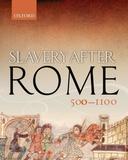Professor Alice Rio
I am a historian of early medieval Europe, with a particular interest in social and cultural history, legal and documentary culture, families and households, women, migration, slavery, and gender. The parts of Europe I know the most about are the Frankish kingdoms, but I am very interested in comparing them with the many other cultures and polities around them.
I started at Oxford in October 2025, after spending most of my earlier career in the Department of History at King’s College London (2009 to 2025). I am currently co-editor of the journal Past & Present.
Research Interests
My initial interest was in legal culture: what makes people choose to express what they think they owe to each other in terms of legal obligations. My first book, Legal Practice and the Written Word in the Early Middle Ages (Cambridge, 2009), was about Frankish notaries’ handbooks, which give a rare glimpse into a lively, eclectic textual community, responding to the demand of clients rather than top-down imposition. My case study was slavery, and the use of unfree status to characterise the service owed by certain people, but not others. This led naturally into my second book, Slavery After Rome, c. 500-1100 (Oxford, 2017), a comparative study of slavery in the centuries following the fall of the Roman empire. My goal for this was to move away from the “transition from slavery to serfdom” narrative which dominated the literature. The uses of unfree status seemed to me to suggest a situation different from the two main historiographical options that were available back then, according to which slavery in the early medieval centuries either remained essentially the same as under the Roman empire or was undergoing a terminal decline. I argued instead that the early medieval period saw some surprising experiments and innovations in the use of unfree status, going in many different directions, and not just towards later serfdom. The situations covered by words for “slave” look contradictory not because these words were weaker or no longer understood and would soon need to be replaced by a new vocabulary of serfdom, but because these claims were being used to do more, and stranger, things. Since then, I wrote a very short book (Slaving and the Funding of Elite Status in Early Medieval Europe (ca. 800-1000 AD) (Bonn, 2024)) to discuss how different regions of Europe engaged, and which ones failed to engage, with a very long-distance slave trade which, in the ninth and tenth centuries, linked Ireland and Iceland to Iraq and Afghanistan.
I am now in the process of finishing my first trade book: a narrative history of early medieval Europe through the experiences of a handful of women who travelled from one European region to another (using the most expansive possible definition of “Europe”, from Iceland to the Caucasus and from Iberia to the Baltic). Taking the point of view of women who were bearers of a minority culture seemed a good way to write a narrative of this period that would avoid both Great Men and exceptionalist national trajectories. The process of writing that book has made me think much harder about foreign women, and foreign mothers especially, and about the household as a setting for the transmission or non-transmission of culture, and I’d like to pursue this in future research.
Featured Publications
Slavery After Rome, 500-1100 (OUP, 2017)
Teaching
I would be happy to hear from students interested in doing doctoral research on any aspect of early medieval western European history.





